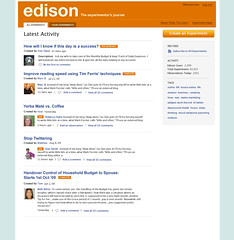What gets better with age?
 Monday, October 26, 2009 at 11:45AM
Monday, October 26, 2009 at 11:45AM 
Some things improve with age (wine is a common example). What else has that characteristic (or the opposite) in time management, or in life? Phrased positively,
- Foods: Cheese, wine, for example. And a continuation of the previous, bread mold, though not all are created equal.
- You: I know you, and you work to make yourself more mature, more resilient, and more knowledgeable. And I deeply respect that. As I get older, my goal is to continue the practice so that, on my last breath, I will still be asking questions. (Like __?) The risk: Getting comfortable and stuck. Tip: If you're used to being the smartest person in the room (a variation on worst musician in the band), you need a new room!
- A project: You know those efforts that flow (yes, you should actually read the book) and gather momentum as they progress? I love them! My goal as a writer and consultant is to help clients have more of those. The risk: Things getting out of control, resources dropping out, and unexpected/unpredictable events. To protect yourself: Evaluate as you move it along, and be willing to change direction. (Hmm. TTL, anyone?)
- A task: Hmm. I'm having trouble thinking of a task that improves the older it gets. If it's paused waiting on something else, then it's not executable and goes on your workflow Waiting For list. If you don't want to do it right now, but don't want to drop it yet, it goes on your Someday/Maybe list. Risk: If it sits around too long, you'll get discouraged or start skipping over it, and be less happier. Tip: Try dating your tasks (not just your Waiting For items). Getting stale? Make taking care of it itself an action.
- Science! You gotta' love an approach to understanding the world that's self-correcting.
- Memories: Fond ones that give you pleasure are a gift; relish them.Risk: Not pruning the negative thoughts that intrude on your mental realm. I struggle with this in particular. (In my case there's a biological component, but I'm always on the lookout for behaviorial tools. Suggestions welcome.)
I'm curious: What else is better old, new, or changes between them over time?






